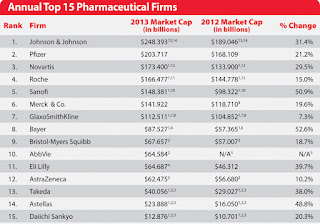 |
| [Click to Enlarge] |
Federal prosecutors are investigating drugmakers’ contracts with companies that manage prescription benefits in the U.S., the latest sign of government scrutiny of how drug companies and industry middlemen do business.
The U.S. attorney’s office for the Southern District of New York has sent demands for information to at least three drug companies: Johnson & Johnson, Merck & Co. and Endo International PLC, according to recent company filings with the U.S. Securities and Exchange Commission.
The so-called civil investigative demands seek information about the companies’ contracts with pharmacy-benefit managers, or PBMs, which administer drug benefits for employers and health insurers. The drug companies didn’t name any specific PBMs in their disclosures.
J&J said in an SEC filing on Tuesday it received a civil investigative demand in March, seeking information about contractual relationships between its Janssen Pharmaceuticals unit and PBMs since 2006, for certain Janssen products.
J&J said the demand was issued in connection with an investigation under the False Claims Act, a federal law that prohibits people and companies from defrauding the federal government.
Merck said in an SEC filing on Monday it received a civil investigative demand for information about its “contracts with, services from and payments to pharmacy-benefit managers” since 2006, in connection with the products Maxalt and Levitra.
Maxalt is a treatment for migraines and Levitra treats erectile dysfunction. The company said it is cooperating with the investigation. A Merck spokeswoman declined immediate comment.
Endo said in an SEC filing last week it received a demand for documents and information about contracts with PBMs for the migraine drug Frova. The company said it is cooperating with the investigation. An Endo spokeswoman said the company doesn’t yet have additional details on the investigation.
A spokesman for the U.S. attorney’s office in New York declined to comment. A civil investigative demand is a government tool to request information that is sometimes broader in scope than a subpoena for documents.
The disclosures of the civil investigative demands don’t identify any benefit manager by name. An Express Scripts Holding Co. spokesman declined comment and a CVS Health Corp. spokesman said the company has “not received a similar inquiry from this U.S. Attorney’s office.”
It is common for drug companies to agree to pay rebates or offer other forms of discounts to PBMs in exchange for these managers agreeing to pay for their members’ use of certain drugs.
By Peter Loftus